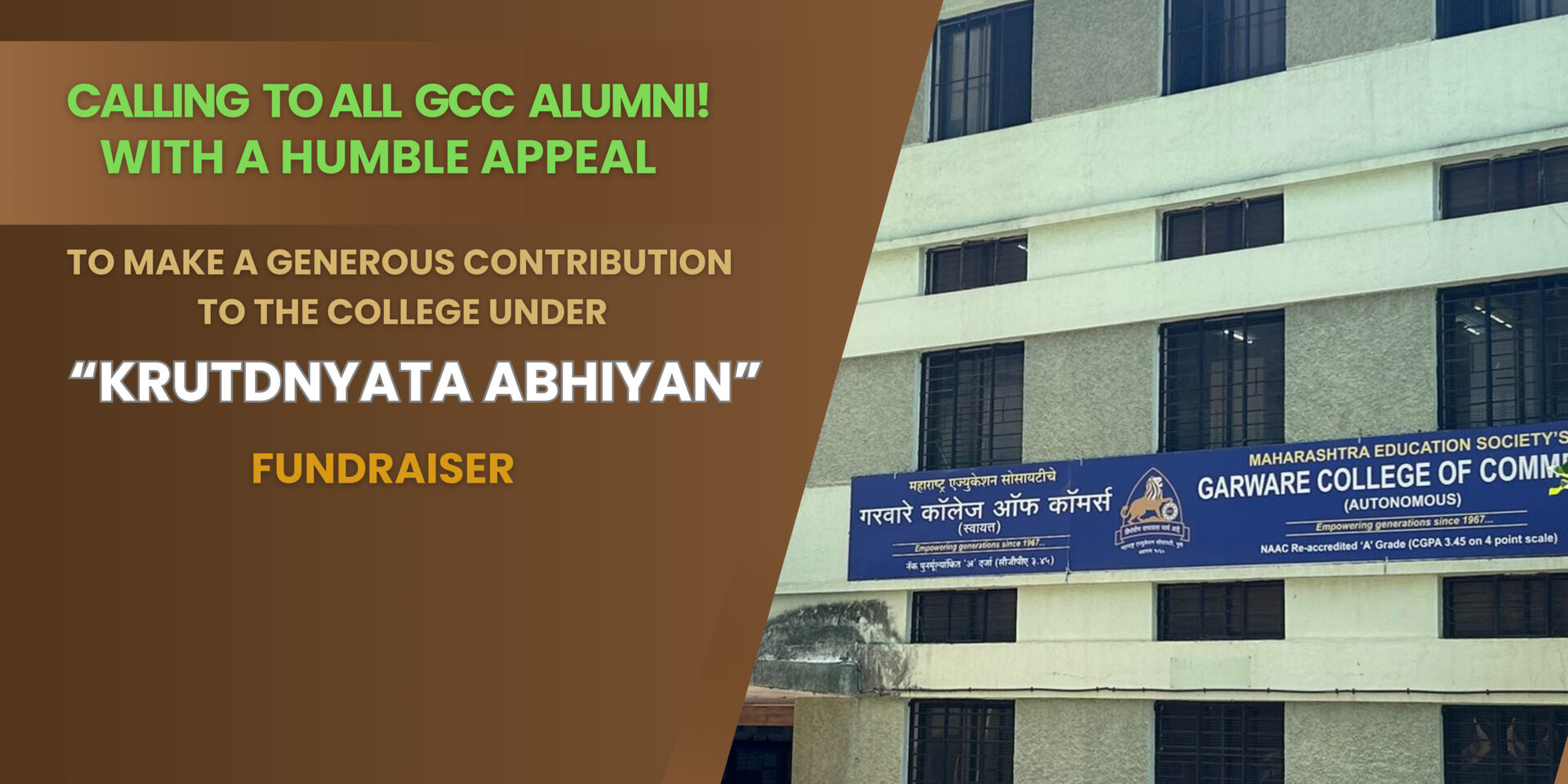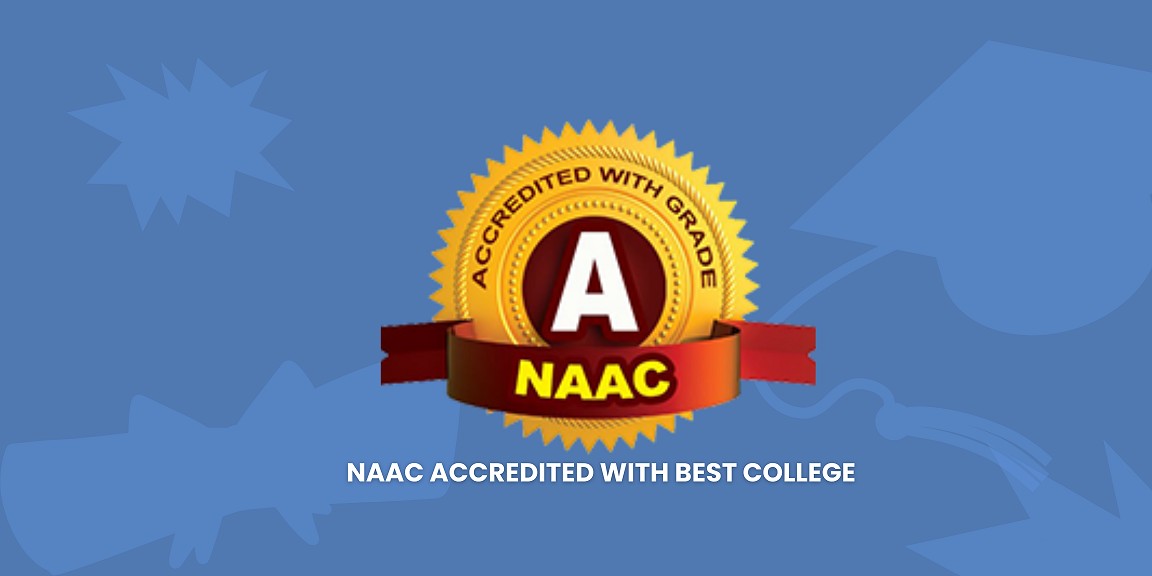INTRODUCTION
B.Com. Programme (Autonomous) is the program designed with a vision to provide industry relevant education in the field of Commerce and Economics. The New Framework of the Programme focuses on the learner centric teaching-learning process which will provide the opportunity to explore and get equipped with knowledge, skills and attitude necessary for gainful employment in the corporate world and for entrepreneurship. Along with the core areas of Accounting, Economics, Corporate Laws, Business Management.
Business Communication and Languages, Computer Concepts and Applications and Business Mathematics and Statistics , this program offers a wide variety of specializations in Cost Accounting, Banking and Finance, Business Environment and Entrepreneurship, Business Laws and Practices, Marketing Management, Business Administration and Vocational Taxation.
The curriculum under Choice Based Credit System will help the students to graduate with strong theoretical knowledge and multidisciplinary skills enabling their holistic development. The integration of technology, project-based learning, add on and value[1]added courses, additional credits for extracurricular and co-curricular activities, the corporate and social internship will help the learners to develop global competencies necessary to work in a dynamic business environment. This will also provide an opportunity to develop a lifelong vision for personality development, career building and for contributing to the National Goals.
Intake capacity
The intake capacity for F.Y., S.Y., and T.Y., B.Com is of 120 students in each division. College provides the facility of 5 divisions for each class. The college follows the reservation rules as per government of Maharashtra and the university norms.
Eligibility
- Candidates shall be admitted to the First Year of B.Com. Programme (CBCS pattern) after passing the Higher Secondary School Certificate Examination of the Maharashtra State Board of Secondary and Higher Secondary (10+2) Education or equivalent from any other Board. B. Com and M. Com Programmes 2021-2022 onwards 17
- Two years diploma course (after S.S.C., i.e. 10th Standard) of Board of Technical Education Government of Maharashtra or its equivalent.
- MCVC.
Medium of instructions
The medium of instructions for B.Com Programme shall be English.
College timings
F.Y.B.Com to T.Y.B.Com and M.Com. – 7.15 a.m to 11.45 a.m
It has to be noted that in unavoidable circumstances, College timing may have to changed for certain duration
Program Objectives
- To develop conceptual understanding and fundamental knowledge in core areas and various disciplines of Commerce and Economics.
- To equip the students with updated and practical knowledge of commerce and industry through project-based learning.
- To develop the global competencies among students by providing stimulating, engaging learning experience with increased emphasis on creativity, independent critical thinking and research.
- To provide the liberty to earn choice-based credits by facilitating synchronous, asynchronous, independent, and experiential learning platforms for development of interpersonal, entrepreneurial, corporate skills and enhancement of employability among the learners.
- To serve the diverse interests of learners and develop multidisciplinary skills through add on & value-added courses and co-curricular, extra-curricular & extension activities.
- To enhance employability by developing a strong industry-oriented learning ecosystem.
- To ensure that our graduates are competent, industrious, entrepreneurial, and socially responsible human beings. 16 MES Garware College of Commerce (Autonomous); Handbook of Autonomy
- To enable innovative solutions for societal well-being, environmental balance and ethical wealth-creation through community engagement and social as well as corporate internships.
Program Outcome
Students would be able to:
- Develop conceptual understanding and sound theoretical foundation in the core areas and various disciplines of Commerce and Economics.
- Gain practical knowledge of the Commerce and Industry
- Develop the global competencies including creativity, independent critical thinking, and research
- Get the liberty to earn choice-based credits and also develop interpersonal, entrepreneurial and corporate skills
- Develop multidisciplinary skills according to their diverse areas of interest
- Enhance employability through industry relevant education
- Become Graduates who are competent, industrious, entrepreneurial, and socially responsible human beings
- Find innovative solutions for societal well-being, environmental balance, and ethical wealth-creation and thereby contribute to the National goals.
Program Duration
Bachelor of Commerce Degree Programme (Choice Based Credit System -CBCS pattern) will be introduced in the following Academic Years:-
- First Year B.Com. 2021-2022
- Second Year B.Com. 2022-2023
- Third Year B.Com. 2023-2024
B.Com. Degree Programme will be of three years, divided into Six Semesters. The First Year (F Y) - Semester I and II, Second Year (S Y) - Semester III and IV and Third Year (T Y) - Semester V and VI
Attendance
No candidate shall be allowed to appear for Semester End Examination unless and until a student fulfills the norms of attendance as per UGC / State Government / The College.
STANDARD OF PASSING:
- The Semester End Examination will be conducted for 60 marks
- Continuous Comprehensive Evaluation (CCE) will be conducted for 40 marks.
- Thus for each paper the examination will be for 100 marks for the semester.
- The passing in the paper will require 40 marks out of 100 marks, in which minimum 24 marks out of 60 marks in the semester end examination are a must. Thus passing in CCE is not compulsory but will be complementary for passing in the paper of said semester.
- A student is declared “pass” if he or she obtains a minimum of 40% marks in Semester End Examination and in internal examination. In case of the shortfall of marks in internal examination , a student will have to make over the shortage of marks in the Semester End Examination. It means it is necessary that a student gets minimum 40 marks out of 100 marks (40 marks of internal examination +60 marks of Semester End examination). For the Semester End examination separate or independent passing is a must it means that student has to get 24 marks out of 60 marks. It also means, there is no separate passing in Internal Examination but there is separate passing for Semester End Examination and for the final result of a paper a student must have to obtain 40% marks out of total 100 marks for the said paper.
- Backlog Internal Examination will be conducted for the students whose Aggregate percentage is less than 40% in particular paper but pass in Semester end examination.
Distribution of Credits
Distribution of total credits for Three Years B.Com. Programme (2021 pattern) is as follows:-
| Sr. No. | Nature of Courses | Semesters (Credits) | Total (Credits) | |||||
| I | II | III | IV | V | VI | |||
| 1 | Core Course | 06 | 06 | 09 | 09 | 09 | 09 | 48 |
| 2 | Core Course Practical | 04 | 04 | 04 | 04 | 04 | 04 | 24 |
| 3 | Generic Elective Course | 09 | 09 | 03 | 03 | -- | -- | 24 |
| 4 | Discipline Special Elective Course | -- | -- | 04 | 04 | 08 | 08 | 24 |
| 5 | Skill Enhancement Course | 01 | 01 | -- | -- | -- | 02 | 04 |
| 6 | Ability Enhancement Compulsory Course | 03 | 03 | 02 | -- | -- | -- | 08 |
| Sub Total | 23 | 23 | 22 | 20 | 21 | 23 | 132 (Grand Total) | |
Distribution of total credits for Three Years B.Com. Programme (2021 pattern) (for Vocational Taxation only) is as follows :-
| Sr. No. | Nature of Courses | Semesters (Credits) | Total (Credits) | |||||
| I | II | III | IV | V | VI | |||
| 1 | Core Course | 06 | 06 | 09 | 09 | 09 | 09 | 48 |
| 2 | Core Course Practical | 04 | 04 | 04 | 04 | 04 | 04 | 24 |
| 3 | Generic Elective Course | 03 | 03 | -- | -- | -- | -- | 06 |
| 4 | Discipline Special Elective Course | 08 | 08 | 08 | 08 | 08 | 08 | 48 |
| 5 | Skill Enhancement Course | 01 | 01 | -- | -- | -- | 02 | 04 |
| 6 | Ability Enhancement Compulsory Course | 03 | 03 | 02 | -- | -- | -- | 08 |
| Sub Total | 25 | 25 | 23 | 21 | 21 | 23 | 138 (Grand Total) | |
Abbreviations and Meaning of various terms used
- Course - A “Course” is a component of a Programme, so in the new system, papers will be referred to as courses. Each course is identified by a unique course code. While designing curriculum, courses can have defined weightages. These weightages are called Credits. Each course, in addition to having a syllabus, has learning objectives and outcomes. A course may be designed to comprise lectures/ tutorials/ field work project/vocational training /viva-voce etc. or a combination of some / any of these.
- Credit - The definition of “Credits” can be based on various parameters. These may be the learning hours put in, learning outcomes and contact hours, the quantum of content/ syllabus prescribed for the course. The Credit System requires that a student progresses in the academic Programmes not in terms of time (years or semesters), but in terms of courses.
- CC - Core Courses - A course, which should compulsorily be studied by a candidate as a core requirement is termed as a Core Course.
- DSC- Discipline Specific Elective Courses - Elective courses offered by the main discipline/ subject of study is referred to as Discipline Specific Elective.
- SEC- Skills Enhancement Courses - These courses are designed to provide value-based knowledge and contains both theory and lab/hands-on/training/field work. The main purpose of these courses is to provide students life-skills in hands-on mode so as to increase their employability.
- AECC- Ability Enhancement Compulsory Courses – These courses are based upon the contents that lead to knowledge enhancement. These courses are mandatory for all disciplines.
Scheme Of Credit
Total credits for three years B.Com. (2021 pattern) is as follows:-
| Sr. No | Semester No | No. of courses | Credit per course | Credit for practical courses | Add on course credit (*) | Lectures + Practical + add on courses= Total Credits |
|---|---|---|---|---|---|---|
| 1 | I | 7 | 3 | 1 | 1 | 21 +1+1 =23 |
| 2 | II | 7 | 3 | 1 | 1 | 21 +1+1 =23 |
| 3 | III | 6 | 3 | 2 | 2(EAC*) | 18+2+2 =22 |
| 4 | IV | 6 | 3 | 2 | -- | 18+2=20 |
| 5 | V | 6 | 3 | 3 | -- | 18+3=21 |
| 6 | VI | 6 | 3 | 3 | 2(Internship$) | 18+3+2=23 |
| Total No. of credits : 132 |
* EAC – Environment Awareness Course
$ Internship – 60 hours internship is compulsory for T. Y. B. Com students.
Non-CGPA Credits
(CGPA – Cumulative Grade Points Average)
| Sr No | Activity | Credits |
| 1 | Cultural Association | |
| Participation in Intercollegiate competition Drama/ music / dance/ Debate/ Elocution and any other performing arts. | 01 | |
| Winner at recognized Intercollegiate competition Drama/ music / dance etc | 02 | |
| Successful completion of Visharad, Arangetram etc. | 02 | |
| Winner at recognized National level competition Drama/ music / dance etc | 03 | |
| Performance commercials/ TV serials/ Movies/ web series, etc. | 01/02 | |
| Winner at recognized International level competition Drama/ music / dance etc | 04 | |
| 2 | Entrepreneurship, Innovation & Start-Up Cell | |
| Participation in Intercollegiate Business Idea competition. | 01 | |
| Winner at college level business idea competition | 01 | |
| Winner at /university/state level business idea competition | 02 | |
| Winner at National level business idea competition | 03 | |
| Winner at International level business idea competition | 04 | |
| Manager/vender at campus company website | 02 | |
| First generation practicing entrepreneurs | 02 | |
| 3 | Sports Representation | |
| Participation in Intercollegiate competition organized under SPPU | 01 | |
| Participation in Inter zonal competition organized under SPPU | 02 | |
| Participation in State Level competition organized by recognized Sport Association (Only for AIU sports events approved by SPPU) | 02 | |
| Participation in inter university sport competition organized under Association of Indian Universities | 03 | |
| Participation in National, Level competition organized by recognized Sport Association (Only for AIU sports events approved by SPPU) | 03 | |
| Participation and Secured First, Second, Third place in inter university sport competition organized under Association of Indian Universities | 04 | |
| Participation and Secured First, Second, Third place in National Level competition organized by recognized Sport Association (Only for AIU sports events approved by SPPU) | 04 | |
| Participation in International Level Sport Competition (Only for AIU sports events approved by SPPU) | 04 | |
| 4 | NSS Representation | |
| Enrollment and active participation for each year | 02 | |
| Participation in Annual camp | 02 | |
| Participation in National Level camp | 03 | |
| Participation in RD parade | 03 | |
| Participation in International Level camp | 04 | |
| 5 | NCC Representation | |
| Enrollment and Active Participation in 1st year NCC | 03 | |
| Enrollment and Active Participation in 2nd year NCC | 03 | |
| Enrollment and Active Participation in 3rd year NCC | 03 | |
| Participation and winner in National Level competition/ Camp | 03 | |
| Participation in Youth Exchange Programme | 04 | |
| 6 | YRC Representation | |
| Participation in district Level camp | 01 | |
| Participation in State Level camp | 02 | |
| Participation in National Level camp | 03 | |
| Participation in International level Camp | 04 | |
| Participation for three days activity or three one day activity | 01 | |
| Extra ordinary social contribution | 04(Maximum) | |
| 7 | Research Activities | |
| (Avishkar/Research Paper Competition/Case Study/Scientific Survey /Societal Survey/ research publication in approved/listed journals ) | ||
| Research Publication at State Level | 01 | |
| Research Publication at National Level | 02 | |
| Research Publication at International Level | 03 | |
| Winner at college level | 01 | |
| Winner at University Level | 02 | |
| Winner at State Level | 02 | |
| Winner at National Level | 03 | |
| Winner at International Level | 04 | |
| Note : For all above research related activities registration must have been done through Department of Research, Innovations and Consultancy (DRIC) of the College | ||
| 8 | Participation in Summer School / equivalent training course / Short Term Course - National or International Level - (minimum 30 hours duration) Applicable from 2nd year | Min - 02 andMax - 03 |
| 9 | Field Visits / Study Tours / Industrial Visits / Similar activities defined by the teacher (In tune with specialization subjects) | 01 |
| 10 | Value Added Courses/ Certificate courses designed by the College in association with external Institute /Agency. For course work 1credit per 15 hours Credits for ‘experiential learning’ to be defined by the organizing Department | Maximum Credits 8 |
| 11 | Certificate Courses / MOOCs Courses | Maximum 08 Credits |
| 12 | Courses in foreign and local languages As per the levels qualified credits will be awarded | Maximum 03 |
| 13 | Intellectual Property Rights Cell Trademark registration, Patent Filling, Copy-writing | Maximum 03 |
| 14 | Live Projects in Industry - S.Y. / T.Y BBA(CA) | Maximum 02 |
Note :- Maximum Credit limit is 8 in three years.
Structure of Choice Based Credit System Course First Year B. Com. Semester – I w.e.f. 2021- 22
| Course Code | Course / Title of Paper | Course | No. of lectures (Per Week) | No of Credits | Continuous Internal Evaluation (Marks 40) | Semester End Examination [Duration:- 2 Hours] | Total Marks | |||
| Mid Semester Examination (MCQ) [Duration:- 40 Minutes] | “Selected from given Option” (Department wise flexibility is given) | Practical Exam | ||||||||
| B1-21/101 | Compulsory English | Core Course | 4 | 3 | 20 | 20 | ----- | 60 | 100 | |
| B1-21/102 | Financial Accounting | Core Course Practical | 4 | 4 | 20 | 20 | 20 | 40 (paper will be for 60 marks converted into 40) | 100 | |
| B1-21/103 | Business Economics | Core Course | 4 | 3 | 20 | 20 | ----- | 60 | 100 | |
| B1-21/104A B1-21/104B
| Business Mathematics and Statistics
Or Computers Concepts and Application. | Core Course | 4 | 3 | 20 | 20 | ----- | 60 | 100 | |
| B1-21/105 |
a) Banking and finance (Not Applicable for Vocational Tax students) | Generic Elective Course |
4 |
3 |
20
|
|
20 |
----- |
60 |
100 |
|
B1-21/106A
B1-21/106B
| Optional Group. (B)
a) Business Environment and Entrepreneurship b) Marketing & Salesmanship
|
Generic Elective Course |
4 |
3 |
20 |
|
20 |
----- |
60 |
100 |
| B1-21/107(I)
B1-21/108(II) | Vocational Taxation Paper I
Paper II | Elective
| 4 | 3 | 20 | 20 | ||||
|
B1-21/109 B1-21/110 | Any one of the following Language a) Additional English b) Marathi
|
ujnElective |
4 |
3 |
20 |
|
20 |
----- |
60 |
100 |
First Year B. Com. Semester – II (w.e.f. 2021- 22)
| Continuous Comprehensive Evaluation (CCE) (Internals) (Marks 40) | |||||||||
| Course Code |
Title of Course /Paper | Nature of Course | Theory / Project | No. of Credits | Various Internal Examinations (Marks 20) | Mid Semester Examination (Marks 20) | Project/ Practical Exam (Marks 20) | Semester End Examination (Marks 60) | Total Marks |
| B1- 21/201 | Compulsory English | Core Course | Theory | 3 | 20 | 20 | ----- | 60 | 100 |
| B1- 21/202 |
Financial Accounting | Core Course Practical | Theory + Project |
4 |
20 |
20 |
20 | 40 (paper will be for 60 marks converted into 40) |
100 |
| B1- 21/203 | Business Economics (Micro) | Core Course | Theory | 3 | 20 | 20 | ----- | 60 | 100 |
| Business Mathematics | |||||||||
| B1- 21/204A | and Statistics | ||||||||
| or B1- | Or | Generic Elective | Theory | 3 | 20 | 20 | ----- | 60 | 100 |
| 21/204B | Computer Concepts and | ||||||||
| Application. | |||||||||
| Continuous Comprehensive Evaluation (CCE) (Internals) (Marks 40) | |||||||||
| Course Code |
Title of Course /Paper | Nature of Course | Theory / Project | No. of Credits | Various Internal Examinations (Marks 20) | Mid Semester Examination (Marks 20) | Project/ Practical Exam (Marks 20) | Semester End Examination (Marks 60) | Total Marks |
| B1- 21/205 | Banking and finance (Not Applicable for Vocational Tax students) | Generic Elective Course |
Theory |
3 |
20 |
20 |
----- |
60 |
100 |
| B1- | Business Environment & | ||||||||
| 21/206A | Entrepreneurship | ||||||||
| Or | |||||||||
| Or | Generic | ||||||||
| Marketing & | Elective | Theory | 3 | 20 | 20 | ----- | 60 | 100 | |
| B1- | Salesmanship | Course | |||||||
| 21/206B | |||||||||
| B1- 21/207(3) | Vocational Taxation Paper III | Discipline Specific Elective Practical | Theory + Project |
4 |
20 |
20 |
20 | 40 (paper will be for 60 marks converted into 40) |
100 |
|
B1- 21/208(4) | Vocational Taxation Paper IV | Discipline Specific Elective Practical | Theory + Project |
4 |
20 |
20 |
20 | 40 (paper will be for 60 marks converted into 40) |
100 |
| Continuous Comprehensive Evaluation (CCE) (Internals) (Marks 40) | |||||||||
| Course Code |
Title of Course /Paper | Nature of Course | Theory / Project | No. of Credits | Various Internal Examinations (Marks 20) | Mid Semester Examination (Marks 20) | Project/ Practical Exam (Marks 20) | Semester End Examination (Marks 60) | Total Marks |
| B1- | |||||||||
| 21/209A | Additional English | ||||||||
| Or | Ability | ||||||||
| Or | Enhancement | ||||||||
| B1- | Course | Theory | 3 | 20 | 20 | ----- | 60 | 100 | |
| 21/209B | Marathi | ||||||||
| B1- 21/210 | Physical Education | Skill enhancement Course | 1 | 25 | |||||
| (Compulsory) | |||||||||
| B1- 21/211 | Add On course | Skill Enhancement course (Compulsory) | 1 | 25 | |||||
| B1- 21/212 | Add on Course on Democracy, Election and Governance | Ability Enhancement Course | 1 | 25 | |||||
Second Year B. Com. Semester – III (w.e.f. 2021- 22)
| Continuous Internal Evaluation (Marks 40) | |||||||||
| Course Code | Course / Title of Paper |
Course | Theory / Project | No of Credits | Various Internal Examinations (Marks 20) | Mid Semester Examination (Marks 20) | Project/ Practical Exam (Marks 20) | Semester End Examination (Marks 60) | Total Marks |
|
B1-21/301 | Business Communication | Core Course Practical | Theory + Practical |
4 |
20 |
20 |
20 | 40 (paper will be for 60 marks converted into 40)) |
100 |
| B1-21/302 | Corporate Accounting | Core Course | Theory | 3 | 20 | 20 | ----- | 60 | 100 |
| B1-21/303 | Business Economics (Macro) | Core Course | Theory | 3 | 20 | 20 | ----- | 60 | 100 |
| B1-21/304 | Business Management | Core Course | Theory | 3 | 20 | 20 | ----- | 60 | 100 |
| B1-21/305 | Elements of Company Law | Generic Elective Course | Theory | 3 | 20 | 20 | ----- | 60 | 100 |
| Special Course | |||||||||
| Continuous Internal Evaluation (Marks 40) | |||||||||
| Course Code | Course / Title of Paper |
Course | Theory / Project | No of Credits | Various Internal Examinations (Marks 20) | Mid Semester Examination (Marks 20) | Project/ Practical Exam (Marks 20) | Semester End Examination (Marks 60) | Total Marks |
| B1-21/306 A (I) | Paper- I (Any One) a) Business Administrat ion b) Banking & Finance c) Business Laws and Practices d) Cost and Works Accounting e) Business | Discipline | |||||||
| B1- 21/306B(I)
B1- 21/306C(I) B1- 21/306D(I)
B1- 21/306E(I)
B1- 21/306F(I) | Specific Elective | Theory + Project | 4 | 20 | 20 | 20 | 40 (paper will be for 60 marks converted into 40) | 100 | |
| Continuous Internal Evaluation (Marks 40) | |||||||||
| Course Code | Course / Title of Paper |
Course | Theory / Project | No of Credits | Various Internal Examinations (Marks 20) | Mid Semester Examination (Marks 20) | Project/ Practical Exam (Marks 20) | Semester End Examination (Marks 60) | Total Marks |
| Entrepreneur ship f) Marketing Management | |||||||||
| B1- 21/307(5) | Vocational Taxation Paper V | Discipline Specific Elective Practical | Theory + Project | 4 | 20 | 20 | 20 | 40 (paper will be for 60 marks converted into 40) | 100 |
| B1- 21/308(6) | Vocational Taxation Paper VI | Discipline Specific Elective Practical | Theory + Project | 4 | 20 | 20 | 20 | 40 (paper will be for 60 marks converted into 40) | 100 |
|
B1-21/309 | Environment Awareness Course | Ability Enhancement Compulsory Course | Theory + Project | 2 | 50 | ||||
Second Year B. Com. Semester – IV (w.e.f. 2021- 22)
| Continuous Internal Evaluation (Marks 40) | |||||||||
| Course Code | Course / Title of Paper |
Course | Theory / Project | No of Credits | Various Internal Examinations (Marks 20) | Mid Semester Examination (Marks 20) | Project/ Practical Exam (Marks 20) | Semester End Examination (Marks 60) | Total Marks |
|
B1-21/401 |
Business Communication |
Core Course Practical |
Theory + Project |
4 |
20 |
20 |
20 | 40 (paper will be for 60 marks converted into 40) |
100 |
| B1-21/402 | Corporate Accounting | Core Course | Theory | 3 | 20 | 20 | ----- | 60 | 100 |
| B1-21/403 | Business Economics (Macro) | Core Course | Theory | 3 | 20 | 20 | ----- | 60 | 100 |
| B1-21/404 | Business Management | Core Course | Theory | 3 | 20 | 20 | ----- | 60 | 100 |
| B1-21/405 | Elements of Company Law | Generic Elective Course | Theory | 3 | 20 | 20 | ----- | 60 | 100 |
| Continuous Internal Evaluation (Marks 40) |
| Course Code | Course / Title of Paper |
Course | Theory / Project | No of Credits | Various Internal Examinations (Marks 20) | Mid Semester Examination (Marks 20) | Project/ Practical Exam (Marks 20) | Semester End Examination (Marks 60) | Total Marks |
|
B1- |
Special Course Paper- I(Anyone) a) Business Administration b) Banking & Finance c) Business Laws & Practices d) Cost and Works Accounting e) Business Entrepreneurship f) Marketing Management | ||||||||
| 21/406A(II) | |||||||||
| B1- | |||||||||
| 21/406B(II) | 40 (paper will | ||||||||
| B1- | Theory | be for 60 | |||||||
| 21/406C(II) | Discipline | + | 4 | 20 | 20 | 20 | marks | 100 | |
| B1- | Specific | Project | converted into | ||||||
| 1/406D(II) | Elective | 40) | |||||||
| B1- | Practical | ||||||||
| 21/406E(II) | |||||||||
| B1- | |||||||||
| 21/406F(II) | |||||||||
| B1- 21/407(7) | Vocational Taxation Paper VII | Discipline Specific Elective Practical | Theory + Project | 4 | 20 | 20 | 20 | 40 (paper will be for 60 marks converted into | 100 |
| Continuous Internal Evaluation (Marks 40) | |||||||||
| Course Code | Course / Title of Paper |
Course | Theory / Project | No of Credits | Various Internal Examinations (Marks 20) | Mid Semester Examination (Marks 20) | Project/ Practical Exam (Marks 20) | Semester End Examination (Marks 60) | Total Marks |
| 40) | |||||||||
| B1- 21/408(8) | Vocational Taxation Paper VIII | Discipline Specific Elective Practical | Theory + Project |
4 |
20 |
20 |
20 | 40 (paper will be for 60 marks converted into 40) |
100 |





































































